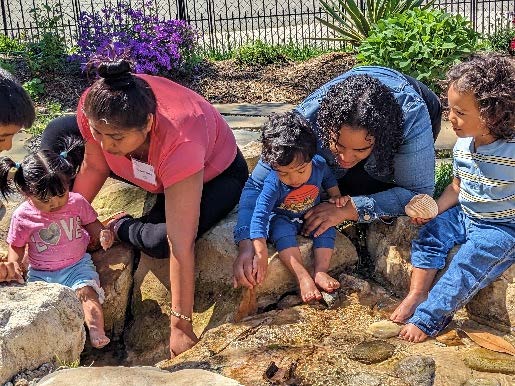 A Conversation with Tamara Schlez, Coach of ADHD at El Futuro
A Conversation with Tamara Schlez, Coach of ADHD at El Futuro
Did you know that nearly 12% of Hispanic children between the ages of 3 and 17 may have ADHD? And yet, many of them never receive the diagnosis or support they need. At El Futuro, we’re working to change that. We sat down with Tamara, our ADHD coach, to better understand this condition and how our community can make a difference.
So, what exactly is ADHD?
Tamara explains:
“ADHD—Attention Deficit Hyperactivity Disorder—is a neurodevelopmental disorder. It affects a part of the brain that’s still maturing, especially the part responsible for attention, time management, task initiation, emotional regulation, and more. These are what we call executive functions.” Although ADHD is often associated with hyperactivity and impulsivity, Tamara points out that emotional dysregulation and low frustration tolerance are also key—and they deeply impact social, academic, and family life. “Imagine a child who can’t manage their frustration or organize their homework. That’s not misbehavior—it’s a brain that needs support to develop.”
Who does ADHD affect?
Tamara tells us that ADHD impacts about 9% of the global population—over 85 million people. But in Hispanic and low-income communities, many children go undiagnosed. “People often blame parenting or label these kids as troublemakers. Meanwhile, their real needs are being missed. They get punished, suspended, and misunderstood.” Among Hispanic children, it’s estimated that around 12% may have ADHD, yet many never receive a formal diagnosis or access to treatment.
What happens when ADHD goes untreated?
“The consequences can be serious,” Tamara says. From low self-esteem to severe behavioral issues, untreated ADHD can lead to challenges in every area of life—including increased risk of substance abuse, accidents while driving, legal issues, or trouble in relationships. “We see teens who believe they’re worthless, that they’re just ‘bad kids.’ And adults who were never diagnosed feel broken, like they can’t keep a job or succeed. They say, ‘I’m dumb. I can’t do this.’” The cycle is painful: frustration → isolation → anxiety or depression.
What kind of support does El Futuro offer?
El Futuro provides a comprehensive approach, based on CDC recommendations:
- Medical treatment with experienced psychiatrists
- Personal coaching for teens and parents
- Parent education classes, with tools and strategies (aka Behavior Parent Training)
- School support, helping families access academic accommodations
“We don’t just treat symptoms. We teach kids and families how to navigate the world—with tools, compassion, and hope.” El Futuro is pioneering the way with over 7 years of developing and testing culturally adapted practices. The results are astounding! Requests from clinicians and parents across the county are coming to El Futuro’s ADHD team for help in developing such services elsewhere.
You can be part of this transformation. When you give to El Futuro, you’re doing more than funding treatment. You’re helping a child realize they’re not broken. They’re not alone. And with the right support, they can thrive.

 Alvely Alcántara, LCSW
Alvely Alcántara, LCSW Rossy C. Garcia, MEd
Rossy C. Garcia, MEd  Katy Sims, MD
Katy Sims, MD  Everardo Aviles, LCSW, LCAS (Eve)
Everardo Aviles, LCSW, LCAS (Eve) As a medical anthropologist and social work researcher, Dr. Gulbas’ research embodies interdisciplinarity through the integration of applied theories of health and human development with qualitative and ethnographic methodologies. Her work seeks to understand how people—children, families, and providers—navigate complex sociocultural landscapes in the pursuit of mental health. Most of her work, to date, focuses attention on developing more robust interpretations of suicide risk. With funding from the National Institutes of Mental Health, this body of research has contributed to advancements in theoretical and empirical knowledge of the broader contexts within which youth suicide risk is situated.
As a medical anthropologist and social work researcher, Dr. Gulbas’ research embodies interdisciplinarity through the integration of applied theories of health and human development with qualitative and ethnographic methodologies. Her work seeks to understand how people—children, families, and providers—navigate complex sociocultural landscapes in the pursuit of mental health. Most of her work, to date, focuses attention on developing more robust interpretations of suicide risk. With funding from the National Institutes of Mental Health, this body of research has contributed to advancements in theoretical and empirical knowledge of the broader contexts within which youth suicide risk is situated.  R. Gabriela Barajas-Gonzalez is a developmental psychologist and an assistant professor of Population Health at NYU Grossman School of Medicine. Dr. Barajas-Gonzalez is the principal investigator of a study that examines the impact of immigration-related threat and stress on school communities. She earned a PhD in developmental psychology from Columbia University and hold a BA in human biology from Stanford University. Dr. Barajas-Gonzalez is the daughter of Mexican immigrants and a first gen college student.
R. Gabriela Barajas-Gonzalez is a developmental psychologist and an assistant professor of Population Health at NYU Grossman School of Medicine. Dr. Barajas-Gonzalez is the principal investigator of a study that examines the impact of immigration-related threat and stress on school communities. She earned a PhD in developmental psychology from Columbia University and hold a BA in human biology from Stanford University. Dr. Barajas-Gonzalez is the daughter of Mexican immigrants and a first gen college student. Dr. Parra-Cardona is an Associate Professor in the Steve Hicks School of Social Work (SHSSW) at the University of Texas at Austin. At the SHSSW, he serves as Coordinator for Mexico and Latin American initiatives. He also serves as Area Director for Research at the UT Austin Latino Research Institute. Dr. Parra-Cardona’s program of research is focused on the cultural adaptation of evidence-based parenting interventions for low-income Latinx populations in the US and Latin America.
Dr. Parra-Cardona is an Associate Professor in the Steve Hicks School of Social Work (SHSSW) at the University of Texas at Austin. At the SHSSW, he serves as Coordinator for Mexico and Latin American initiatives. He also serves as Area Director for Research at the UT Austin Latino Research Institute. Dr. Parra-Cardona’s program of research is focused on the cultural adaptation of evidence-based parenting interventions for low-income Latinx populations in the US and Latin America. Bianka Reese, PhD, MSPH is a research scientist and program evaluator specializing in adolescent and young adult sexual and reproductive health. Her previous research in the experiences of Latinx LGBTQ+ youth stems from her work as the Research and Evaluation Manager at SHIFT NC (Sexual Initiatives For Teens), where she led largescale evaluations of multilevel, community-based sexual health promotion initiatives and research projects aimed at elevating the voices of diverse youth in North Carolina. Dr. Reese is currently the Senior Research Strategist at Creative Research Solutions, LLC, an award-winning national evaluation, research, and assessment firm.
Bianka Reese, PhD, MSPH is a research scientist and program evaluator specializing in adolescent and young adult sexual and reproductive health. Her previous research in the experiences of Latinx LGBTQ+ youth stems from her work as the Research and Evaluation Manager at SHIFT NC (Sexual Initiatives For Teens), where she led largescale evaluations of multilevel, community-based sexual health promotion initiatives and research projects aimed at elevating the voices of diverse youth in North Carolina. Dr. Reese is currently the Senior Research Strategist at Creative Research Solutions, LLC, an award-winning national evaluation, research, and assessment firm. Tania Connaughton-Espino, MPH is an independent researcher focused on adolescent and young adult sexual and reproductive health. Her interest in the experiences of Latinx LGBTQ+ youth stems from her previous work with SHIFT NC (Sexual Initiatives For Teens), where she led the training and evaluation department, conducted capacity-building workshops for youth serving professionals including on the topic of how to be more affirming of LGBTQ youth, and from her extensive experience working with the Latinx population in NC.
Tania Connaughton-Espino, MPH is an independent researcher focused on adolescent and young adult sexual and reproductive health. Her interest in the experiences of Latinx LGBTQ+ youth stems from her previous work with SHIFT NC (Sexual Initiatives For Teens), where she led the training and evaluation department, conducted capacity-building workshops for youth serving professionals including on the topic of how to be more affirming of LGBTQ youth, and from her extensive experience working with the Latinx population in NC. Maru Gonzalez, EdD is an Assistant Professor and Youth Development Specialist in the Department of Agricultural and Human Sciences at North Carolina State University. Her areas of inquiry include youth development with a focus on activism, social justice, and the experiences of LGBTQ+ young people across familial, school, and community contexts.
Maru Gonzalez, EdD is an Assistant Professor and Youth Development Specialist in the Department of Agricultural and Human Sciences at North Carolina State University. Her areas of inquiry include youth development with a focus on activism, social justice, and the experiences of LGBTQ+ young people across familial, school, and community contexts.  Nayeli Y. Chavez-Dueñas, PhD
Nayeli Y. Chavez-Dueñas, PhD Hector Y. Adames, PsyD
Hector Y. Adames, PsyD